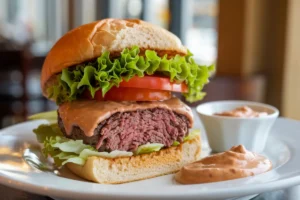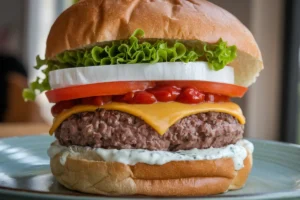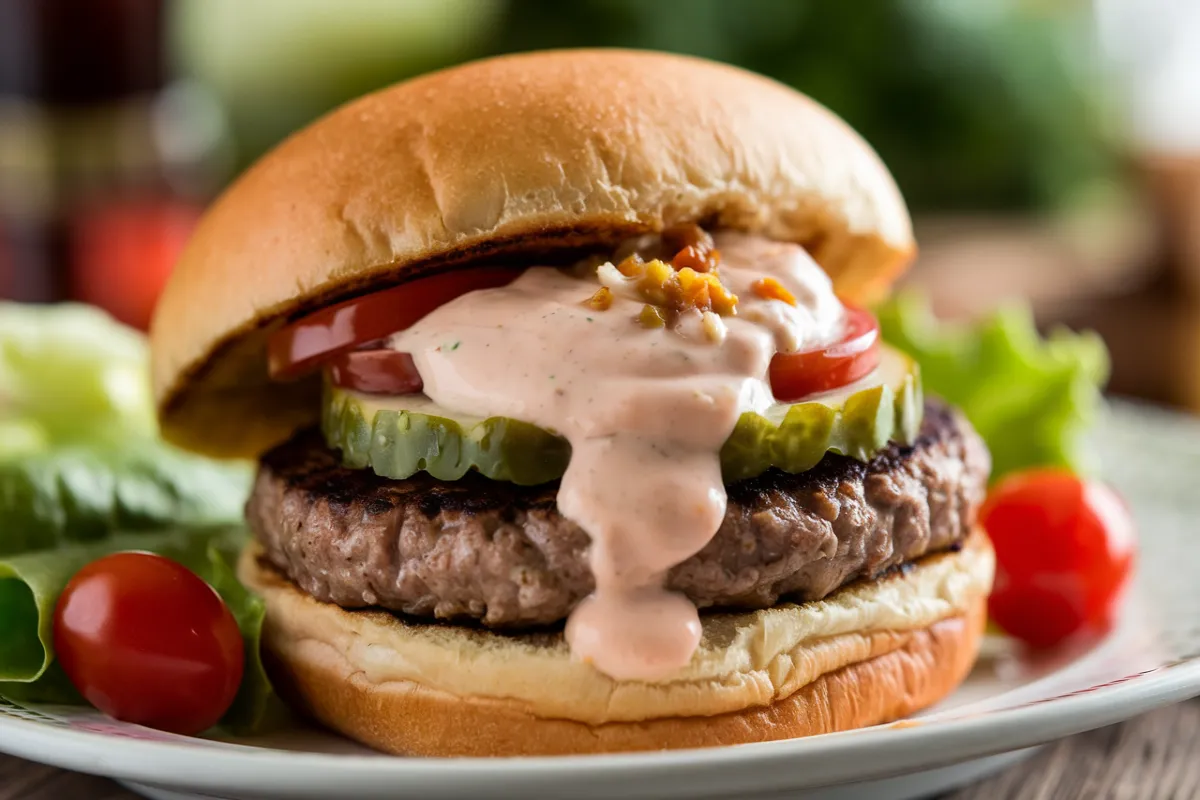Burgers are a beloved culinary staple across the world, and while the patty and bun are critical, what often sets a burger apart is the sauce. That tangy, creamy, and slightly sweet condiment that elevates the taste of the beef, chicken, or plant-based patty is an essential ingredient in achieving burger greatness. So, what exactly is the good burger sauce made of? Let’s dive deep into the core ingredients, their roles, possible variations, and everything you need to know to create the ultimate burger experience.
Classic Ingredients of a Good Burger Sauce
At its core, a good burger sauce typically consists of the following key ingredients:
- Mayonnaise – The Base
- Ketchup – Sweet and Tangy
- Mustard – Adding Zing
- Pickle Relish – For Texture and Tang
- Vinegar – Acidity to Balance the Creaminess
- Spices and Seasonings – A Personalized Touch
Let’s break down these ingredients further to understand their significance.
1. Mayonnaise – The Base
Mayonnaise forms the creamy base for most burger sauces. Its smooth and rich consistency binds the other ingredients together while adding a subtle, savory flavor. The fat content of mayonnaise also helps balance out the acidity and sweetness of the other ingredients, creating a harmonious blend.
Commercially available mayonnaise is made from oil, egg yolks, lemon juice, or vinegar, with some emulsifiers to stabilize the mixture. While store-bought mayo is convenient, making your own mayonnaise from scratch can add an extra layer of freshness and richness to the sauce. Homemade mayonnaise allows you to control the quality of the oil, customize the flavor, and even experiment with healthier oils like avocado or olive oil.
2. Ketchup – Sweet and Tangy
Ketchup is another essential ingredient in a classic burger sauce, providing sweetness, tanginess, and a bit of acidity. The sweetness comes from the high sugar content, while the tanginess is courtesy of the vinegar and tomato paste base.
Ketchup also adds a bright red color to the sauce, making it visually appealing. Some versions of burger sauce swap ketchup for BBQ sauce, offering a smoky flavor profile. Other variations may incorporate tomato paste for a less sweet, more concentrated tomato flavor.
3. Mustard – Adding Zing
Mustard contributes a sharp, tangy bite that helps cut through the richness of the mayo and the sweetness of the ketchup. Yellow mustard is the most commonly used variety, offering a mild and slightly vinegary taste that complements the other flavors.
However, many variations exist. Dijon mustard adds a refined, slightly spicier note, while whole-grain mustard brings a more rustic texture to the sauce. In some spicy versions of burger sauce, mustard can be swapped out for hot sauce to increase the heat level.
4. Pickle Relish – For Texture and Tang
Pickle relish is often added to burger sauces for both flavor and texture. The relish adds a crunchy contrast to the creamy base while delivering a salty, tangy punch. The acidity from the pickles enhances the overall flavor of the sauce and adds an element of complexity.
Many burger sauces also include finely chopped dill pickles instead of relish for a fresher, more robust pickle flavor. For those who enjoy a sweeter touch, sweet pickle relish can also be used.
5. Vinegar – Acidity to Balance the Creaminess
Vinegar adds acidity that is critical for balancing out the creamy mayonnaise and the sugar in the ketchup. It also brightens up the sauce, giving it that zingy finish that makes every bite of the burger irresistible.
Various types of vinegar can be used depending on the flavor profile you’re aiming for. White vinegar is the standard choice, but apple cider vinegar can add a slightly fruity note, while rice vinegar lends a milder flavor. Balsamic vinegar can be used to create a richer, more complex sauce if you’re going for a gourmet burger.
6. Spices and Seasonings – A Personalized Touch
The spices and seasonings used in burger sauce can vary widely depending on personal preference. Common seasonings include garlic powder, onion powder, smoked paprika, and black pepper. Each of these adds depth to the sauce, enhancing the umami flavor of the burger.
For a spicier version, cayenne pepper or hot sauce can be added. Worcestershire sauce, with its savory, umami-packed flavor, is another common addition that helps give the sauce an extra layer of complexity. Herbs such as dill, parsley, or chives can also be incorporated for added freshness and flavor.
The Evolution of Burger Sauce

While the basic components of burger sauce have remained largely unchanged, the evolution of global culinary influences and dietary trends has led to new variations and twists on the classic recipe. In some regions, burger sauce is heavily influenced by local flavors and ingredients. In others, chefs have innovated with plant-based alternatives and healthier substitutions for traditional ingredients.
Regional Variations of Burger Sauce
American-Style Sauce
In the United States, the classic burger sauce often resembles Thousand Island dressing. Made with a mix of mayonnaise, ketchup, mustard, and pickle relish, it’s creamy, tangy, and sweet – perfect for balancing the savory flavors of a beef burger.
European Influence
In European countries like the UK and France, you’ll often find more gourmet versions of burger sauces. For instance, French-style sauces may incorporate Dijon mustard, capers, and even a splash of wine or brandy for a more refined flavor.
Asian-Inspired Sauces
In some Asian cuisines, burger sauces are often spiced up with ingredients like Sriracha, soy sauce, or miso. These additions bring a savory, umami-packed punch to the sauce, providing a rich complement to both meat-based and plant-based burgers.
Health-Conscious Alternatives
As dietary preferences shift towards healthier eating, many home cooks and chefs are seeking ways to make burger sauces that are lower in calories, sugar, and fat. Here are some options for healthier burger sauces:
- Greek Yogurt-Based Sauce: Greek yogurt can be substituted for mayonnaise to create a lighter, tangy sauce that is still creamy but has significantly fewer calories and fat. The addition of lemon juice and mustard ensures that the sauce remains flavorful.
- Avocado-Based Sauce: Using mashed avocado instead of mayonnaise results in a creamy, nutrient-packed burger sauce that is rich in healthy fats and has a delightful green hue. Lime juice, garlic, and cilantro are often added to this type of sauce for a zesty flavor.
- Plant-Based Sauce: For vegan or plant-based burger sauces, cashew cream or coconut-based mayo alternatives work as a great substitute for traditional mayonnaise. These sauces can be made just as flavorful with the addition of spices, mustard, and tomato-based ingredients.
Crafting the Perfect Burger Sauce: Tips and Tricks
Creating the ideal burger sauce isn’t just about following a recipe – it’s about balancing flavors and textures to suit your personal taste. Here are some pro tips to help you master the art of burger sauce:
- Taste as You Go: Balance is key in burger sauce. Start with small quantities of each ingredient and taste frequently as you adjust the levels of sweetness, acidity, and spice. You might want more mustard for extra tang, or more pickle relish for added texture.
- Refrigerate for Best Flavor: After mixing your ingredients, allow the sauce to rest in the refrigerator for at least an hour before serving. This gives the flavors time to meld together and develop, making the sauce even more delicious.
- Adjust for Different Burger Types: If you’re making a sauce for a beef burger, you might want to emphasize umami and savory flavors with ingredients like Worcestershire sauce and smoked paprika. For a chicken burger, you might opt for a lighter, zestier sauce with more citrus or vinegar. Plant-based burgers often pair well with creamy, slightly tangy sauces like avocado-based versions.
- Consider Texture: While smooth sauces are classic, don’t be afraid to add some texture with finely chopped onions, capers, or even jalapeños. The crunch can add an exciting element to your burger.
Pairing Burger Sauce with the Right Burger

The right sauce can make or break your burger experience. Different types of burgers call for different sauce pairings to bring out the best in the flavors and textures. Here’s how to match your burger sauce with the perfect burger:
Beef Burgers
Beef burgers are rich and savory, which makes a slightly sweet and tangy sauce like the classic burger sauce a perfect match. The ketchup and mayo base adds creaminess, while the mustard provides just the right amount of acidity to cut through the richness of the beef. Consider adding Worcestershire sauce to deepen the umami flavor for beef burgers.
Chicken Burgers
Chicken burgers are lighter in flavor, so a sauce with more acidity and tang can enhance their taste. Greek yogurt-based sauces with lemon juice, garlic, and fresh herbs like parsley or dill pair well with the mildness of chicken. For a little heat, consider a spicy Sriracha-mayo sauce to complement the juicy chicken patty.
Veggie and Plant-Based Burgers
For veggie burgers, sauces that are bold in flavor work best. Try a sauce with avocado or hummus as a base to add creaminess without overwhelming the flavors of the vegetables. Burger sauces with a kick, such as spicy mayo or chipotle sauce, can also bring a dynamic flavor contrast to plant-based patties.
Fish Burgers
Fish burgers, such as those made from salmon or tuna, benefit from lighter, tangy sauces. Dill, capers, and lemon zest can enhance the natural flavors of the fish. Aioli made from garlic and olive oil can also serve as a delicate but flavorful complement.
The Cultural Significance of Burger Sauces
Burger sauces, like the burgers themselves, have taken on cultural significance around the world. From fast food chains to gourmet burger joints, sauces play a crucial role in defining a burger’s identity. In America, the Thousand Island-inspired sauce has become an iconic addition to many burgers, often associated with classic fast food.

